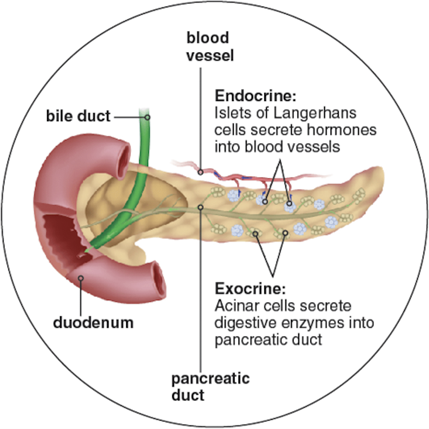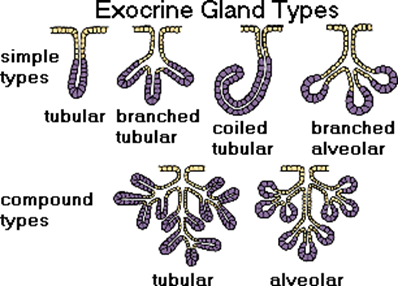Which of the following has both endocrine and exocrine functions?
Thyroid gland.
Pancreas.
Anterior pituitary.
Liver.
The Correct Answer is B

The pancreas is an organ that has both endocrine and exocrine functions.
As an endocrine gland, it secretes hormones such as insulin and glucagon that regulate blood sugar levels.
As an exocrine gland, it releases substances that neutralize stomach acid and digestive enzymes that break down proteins, fats, and carbohydrates.
Choice A is wrong because the thyroid gland is only an endocrine gland.
It secretes hormones such as thyroxine and calcitonin that regulate metabolism and calcium levels.
Choice C is wrong because the anterior pituitary is only an endocrine gland.
It secretes hormones such as growth hormone, prolactin, and adrenocorticotropic hormone that regulate growth, lactation, and stress response.
Choice D is wrong because the liver is mainly an exocrine gland. It produces bile that helps digest fats and detoxifies the blood.
The liver also has some endocrine functions, such as producing insulin-like growth factor 1 and angiotensinogen, but these are not its primary roles.
Nursing Test Bank
Naxlex Comprehensive Predictor Exams
Related Questions
Correct Answer is D
Explanation
Exocrine glands secrete through ducts or tubes to the body’s exterior.

For example, sweat glands, salivary glands, and liver are exocrine glands.
Choice A is wrong because exocrine glands do not only secrete salts, but also other substances such as enzymes, mucus, and sebum.
Choice B is wrong because exocrine glands do not secrete hormones at all.
Hormones are secreted by endocrine glands, which are ductless glands that release their products directly into the bloodstream.
Choice C is wrong because exocrine glands do not secrete into the bloodstream, but onto an epithelial surface such as the skin or the gastrointestinal tract.
Only endocrine glands secrete into the bloodstream.
Correct Answer is B
Explanation
The correct answer is choice B. False.
Arteries are strong, elastic vessels that carry blood away from the heart, except for the coronary arteries that supply blood to the heart muscle.
These are the first arteries to branch off the aorta, which is the main artery that takes blood to the body from the left ventricle.
Choice A is wrong because it contradicts the definition of arteries. Arteries carry blood away from the heart, not to the heart.
Whether you are a student looking to ace your exams or a practicing nurse seeking to enhance your expertise , our nursing education contents will empower you with the confidence and competence to make a difference in the lives of patients and become a respected leader in the healthcare field.
Visit Naxlex, invest in your future and unlock endless possibilities with our unparalleled nursing education contents today
Report Wrong Answer on the Current Question
Do you disagree with the answer? If yes, what is your expected answer? Explain.
Kindly be descriptive with the issue you are facing.
